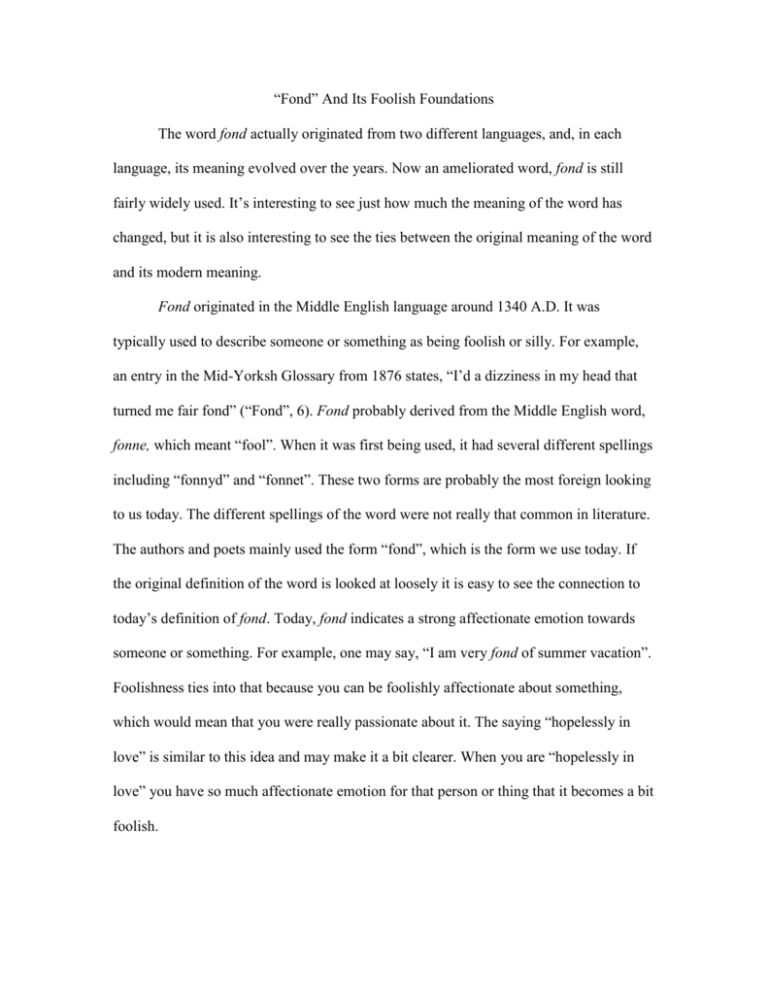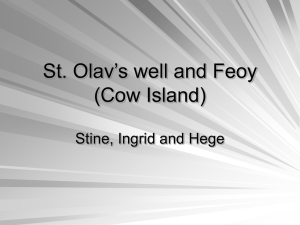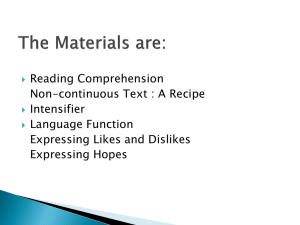The Etymology of 'Fond': From Foolish to Affectionate
advertisement

“Fond” And Its Foolish Foundations The word fond actually originated from two different languages, and, in each language, its meaning evolved over the years. Now an ameliorated word, fond is still fairly widely used. It’s interesting to see just how much the meaning of the word has changed, but it is also interesting to see the ties between the original meaning of the word and its modern meaning. Fond originated in the Middle English language around 1340 A.D. It was typically used to describe someone or something as being foolish or silly. For example, an entry in the Mid-Yorksh Glossary from 1876 states, “I’d a dizziness in my head that turned me fair fond” (“Fond”, 6). Fond probably derived from the Middle English word, fonne, which meant “fool”. When it was first being used, it had several different spellings including “fonnyd” and “fonnet”. These two forms are probably the most foreign looking to us today. The different spellings of the word were not really that common in literature. The authors and poets mainly used the form “fond”, which is the form we use today. If the original definition of the word is looked at loosely it is easy to see the connection to today’s definition of fond. Today, fond indicates a strong affectionate emotion towards someone or something. For example, one may say, “I am very fond of summer vacation”. Foolishness ties into that because you can be foolishly affectionate about something, which would mean that you were really passionate about it. The saying “hopelessly in love” is similar to this idea and may make it a bit clearer. When you are “hopelessly in love” you have so much affectionate emotion for that person or thing that it becomes a bit foolish. During this same time period, from around 1340 A.D. through the nineteenth century, fond actually had a second meaning in the Middle English language. Its second meaning had a more negative connotation, which shows just how much the word ameliorated over time. It was used to describe things that were insipid or sicklyflavored. This definition is really odd because when a person normally thinks of the word fond a more pleasant connotation arises. This definition, however, implies the opposite. It is quite uncommon to see fond used this way, most of the time it is used with a more positive implication. As the years went on, the meaning of fond came closer and closer to its modern day meaning. In 1603, Shakespeare wrote, “ile bribe you… Not with fond Sickles of the tested gold” (“Fond”,6). In this sentence, Shakespeare uses fond to show obsessive value of “trivial” objects. In 1641, Hinde writes in J. Bruen, “Fond affection without moderation”. In this sentence, fond is used to show an excessive affection towards someone. In regards to people, when a person is fond of another person he or she is generally admirable of his or her “actions and attributes” (“Fond”, 6). Concerning opinions, fondness of an opinion generally means that the person is passionate about an idea or belief. The word fond also originated in France, but the meaning was completely different than the Middle English meaning. In French, the forms of the word were “fond”, “fonds”, and “fonde”, and in Old French the forms were “fonz” and “fons”. The word had three basic meanings in French. The first meaning was foundation. This makes sense because it is easy to see where the English word “foundation” could be derived from the French word “fond”. The second meaning is a bit more outlandish. Fond was also another term for lace-making. It is essentially the groundwork or foundation of lace-making. The final meaning of fond was a sum of money. Later, this was replaced by “fund”, which derived from the Latin word “fundus”. We use the word “funds” to refer to money as well. While the French word fond did influence the meaning of our English word “foundation”, it did not really have any influence over our modern English translation of fond. Our translation came solely from the Middle English definition of the word, which was really established around 1590 when the word began to be used to show strong affection. Today, fond is only used to indicate strong affection for someone or something, but this affection generally refers to innocent, admirable affection rather than affection based on superficial attraction. The definition went from describing a state of being to describing an emotion, which is more abstract. . It is really amazing how a word like fond with a simple definition can evolve completely so that it meaning has become more complex. Works Cited "Fond."Oxford English Dictionary. VI. 1989.







